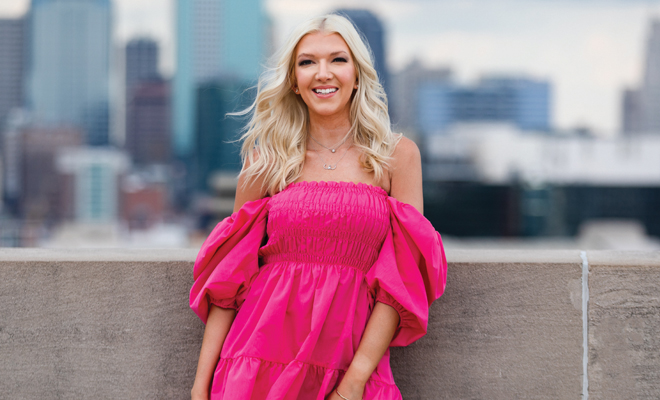 Amber J Deery
Amber J Deery
Alex Whitaker Cheadle: A Positive Life after Cancer
According to the American Cancer Society, about one in eight women will be diagnosed with invasive breast cancer during her life. It’s the most common cancer for American females, except for skin cancers. Normally, breast cancer strikes older women; it’s rare in young females, however, it’s the most common cancer for them. It can be especially aggressive because many times it’s diagnosed in its later stages. Shockingly, survival rates are lower for women younger than 40, who are 30 percent more likely to die compared to women diagnosed between the ages of 51 and 60.
Those were the odds facing Alex Whitaker Cheadle, a Kansas Citian who is now 28 and who was diagnosed four years ago with an aggressive breast cancer. “I was only 24 with no family history of breast cancer. But my lump presented itself so quickly,” recalled Alex. “Nothing was found during my wellness exam in October but then I discovered a lump in January.”
Even though breast cancer didn’t run in her family and her young age might have moved others to disregard the lump, Alex decided to see a gynecologist for an exam. The physician agreed that it was probably benign, but to be sure, sent her to an imaging office for an ultrasound and mammogram. A mass was noted, which meant a biopsy, and on February 8, 2018, she was diagnosed with Stage I, invasive ductal carcinoma.
“My life since that moment has been a blur of appointments, tests, treatments and surgeries, from chemotherapy to fertility preservation to a mastectomy and breast reconstruction surgery,” she shared. “You could say my life after cancer has been a bit overwhelming.”
Whitty’s Titty Committee
Not only was she dealing with the reality of having breast cancer and the impact it would have on her life, but she felt alone. Support groups were more focused on helping women in older age groups, not someone barely into her 20s. But with that unsettling sense of being lost, she found a calling. It was then that the concept of Whitty’s Titty Committee came into being. Her blog, named after a brainstorming gathering with her close friends, is designed to educate and inspire others experiencing breast cancer at such a young age. Bravely and without reservation, she posted her journey with words and photos.
“I was diagnosed so young and didn’t have anyone close to me that I could turn to that had gone through this. A lot of the resources from the hospital had pictures of women who were my grandmother’s age. There’s nothing wrong with that, but when you’re diagnosed at my age, there is a totally different set of issues and questions that I had that these women weren’t experiencing. They weren’t concerned about fertility or chemical menopause or how do I work and juggle all of these things. All of these questions I couldn’t find the answers to so I decided to start my blog,” she commented. “I have my skills from my career. I know how to tell a story and get the message out there. I felt very strongly about not having the feeling that I was the only one going through this. I wanted to create that space and resource and an online support community. I knew there were women like me online and they shouldn’t have to go through this alone.”
Offering Advice to Others
Her career in marketing and public relations gave her a solid foundation from which to launch this new endeavor. Now, her social media platforms boast about 9,000 followers and her website/blog/Facebook/Instagram totals about 200,000 unique viewers every year. Over the past three and a half years, she’s shared her story with local media in Kansas City and her hometown of Orlando, Florida, and national media such as Healthy magazine and PEOPLE magazine.
“The most popular resources are the pages where I talk about week by week for every chemo infusion, my hair loss and my mastectomy product guides, which are super popular. When I had the mastectomy, they gave me an uncomfortable compression bra that wasn’t good,” she recalled. “What’s difficult after you have the surgery is that you have drains on each side by your ribs. It was hard to sit up in bed, and I’m a side sleeper, but there are many types of pillows to help you. Some people rent a recliner to sleep in because they’re easier to get up. There are pregnancy pillows, wedge pillows and different types of clothing because you can’t lift your arms. You still have to go to doctor’s appointments so I needed clothes that I could leave the house in.”
With the support of her husband, Timothy, Alex continued to work full time through her treatments, although she says she was working remotely before everyone was working remotely. To help with her schedule, she planned her chemo every three weeks, beginning on Thursdays, and then IV fluids were administered to her on Fridays. That meant she was sick on Friday, Saturday and Sunday and could get back to work on Monday. Alex notes that working helped because she had something else to focus on rather than on being sick. She says that it was somewhat more normal to do work every day, which offered a welcomed distraction for her.
However, the mental hardship of anxiety presented itself after six rounds of chemo from March until June 2018 and a full calendar year of another infusion that targeted her hormones, which amounted to once every three weeks. She notes that it was jarring being in that constant state of treatment and then moving back to a somewhat normal life, which was a quick change. “Chemo sucks but at least when I’m doing chemo I’m doing something to fight this. Then, all of a sudden, I guess, I’m all right,” she said. “You have to trust your body and trust your doctors, which I did, but it gave me a lot of anxiety. I still deal with that now but I go to therapy every other week and it’s been super helpful.”
Expanding Her Platform
Alex says she is always looking for new ways to reach more people affected by breast cancer and to share her story to create positive change. One avenue that she launched this spring is an online boutique called Shop Petals, which she says came about after her mastectomy because she couldn’t wear normal clothes due to mobility issues.
“I was shopping in the nursing home section because I couldn’t go to one store and shop normally. I put together a collection of clothes that any young woman would wear but especially those post-surgery or looking for clothes that would fit their new bodies. Rompers, jumpsuits, bodysuits are awesome because you can just pull them on,” she stated. “It’s a passion project, a fun thing and I enjoy it. Most customers are under 40. I speak to breast cancer the most but women with other mobility issues can find clothes they can adjust themselves. I wanted clothes that anyone would wear but with the addition of offering pieces that are easy to put on and take off.”
Life Will Never Be the Same
Even after being declared cancer-free, Alex added that she will never be the same after surviving breast cancer because it impacts everything about her life and how she lives it. “There are things I could do before cancer that I can no longer do; things I can no longer wear and parts of my body that I’ll never get back. Helping other women understand this and know they aren’t alone is a huge goal of mine,” she commented. “Also, I have seen that talking about these issues and sharing the solutions I’ve found is extremely helpful to others. Having a young woman as a resource and guide of sorts is something I wish I had to look to when I was diagnosed. I love that I can be that for others.”
While Whitty’s Titty Committee continues its growth, Alex offers sound advice for others thinking of expanding into a new endeavor. Her journey was taking a wellness tragedy and reshaping it into a platform for helping others through a very difficult period. But her thoughts can drive any new adventure in your life. “If you’re passionate about it, it will be easy,” she advised. “I speak from the heart and I’m transparent with everything. That was my goal. I wanted to help people. It sounds cheesy, but it’s the truth.”
Alex is tremendously happy to share that she is a breast cancer survivor. She overcame steep odds by being proactive and believing that she deserved the best care possible to contest this ruthless disease that battles its younger victims with an uncommon harshness. “Be your own best advocate when it comes to your health. You know your body best,” she remarked. “Don’t be afraid to get a second or third opinion or even fourth opinion if something doesn’t feel right to you. You only get one body and one life so treat it right and get the answers you deserve.” ■









